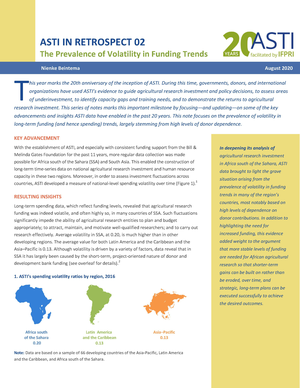Authors:
Nienke Beintema
Year:
2020
Publisher
International Food Policy Research Institute
Back to:
2020 marks the 20th anniversary of the inception of ASTI. To highlight this important milestone, the program released a Series of Notes focusing on—and updating—some of the key advancements and insights ASTI data have enabled in the past 20 years. This note focuses on the prevalence of volatility in long-term funding (and hence spending) trends, largely stemming from high levels of donor dependence.
With the establishment of ASTI, and especially with consistent funding support from the Bill & Melinda Gates Foundation for the past 11 years, more regular data collection was made possible for Africa south of the Sahara (SSA) and South Asia. This enabled the construction of long-term time-series data on national agricultural research investment and human resource capacity in these two regions. Moreover, in order to assess investment fluctuations across countries, ASTI developed a measure of national-level spending volatility over time.
Long-term spending data, which reflect funding levels, revealed that agricultural research funding was indeed volatile, and often highly so, in many countries of SSA. Such fluctuations significantly impede the ability of agricultural research entities to plan and budget appropriately; to attract, maintain, and motivate well-qualified researchers; and to carry out research effectively. Average volatility in SSA, at 0.20, is much higher than in other developing regions. The average value for both Latin America and the Caribbean and the Asia–Pacific is 0.13. Although volatility is driven by a variety of factors, data reveal that in SSA it has largely been caused by the short-term, project-oriented nature of donor and development bank funding.

